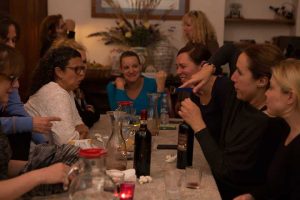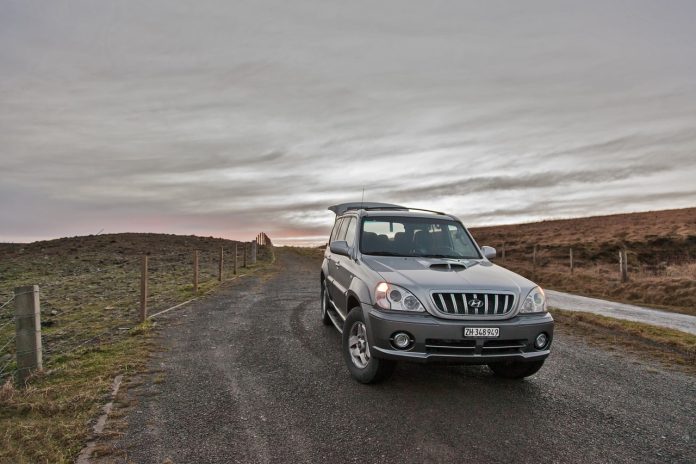By Sonya Huber
We both welcomed something as normal as a car accident.
My newish boyfriend Cliff, my five-year-old son, and I were halfway to Ohio from Georgia. The plan was that my son would see his dad, I’d do some freelance teaching, and we’d go to my best friend’s wedding and then a few days in Costa Rica, our first vacation. It was a jammed schedule, but I was a pro at cramming chaos into a calendar. We stopped in a sea of brake lights on that misty summer evening in North Carolina and tires squealed. We ricocheted forward, colliding with the bumper ahead.
My stomach dropped as I glanced at him. I think I was waiting for the nice-guy veneer to wear off, or waiting for him to wise up and flee this ramshackle dating-a-single-mom situation.
Cliff smiled at me and sighed, then glanced to the back seat. “Everybody okay?”
In the nine months we’d been dating, he kept surprising me with these normal human reactions. He’d pour me a cup of coffee and my eyes would tear up. He’d tell me to have a good day at work and I’d be crushed with gratitude. “Sonya, this is not heroism,” he’d say. “This is what human beings do for each other.” I had lost touch with normal expectations after my own collisions of the heart and mind.
We got out and surveyed the damage. The SUV’s bumper had crimped our car’s trunk in vertical pleats like a pierogi, trapping our stuff along with my swanky red bridesmaid dress inside.
We waited for the police. I clutched my cell phone and copied down claim numbers while Cliff played catch with my son on the wide median in the pinkish waning light. About an hour later, we got the okay to pull away. “Thank you for playing catch,” I said to Cliff. “And for dealing with all of this.” I waved my hands in circles.
This: My full-time job and an active boy, with no extended family nearby to help. Plus, the divorce was an actively festering sore of fear and anxiety. My child’s father had checked out during the marriage but had lately taken to a text and voicemail campaign of verbal abuse. We had a safety plan and the county police on speed dial. Now I was prone to flinching and expecting the worst. Each day was a barely-made-it, a bubble of willed happiness I swear I wove like a spider with glue from my viscera.
In these past nine months Cliff had repeatedly shrugged. “What? It’s not a big deal. You know I’ve been through my own kind of hell.”
He’d finally told me the story of that hell. He’d been in love with a Christian fundamentalist for five years, a woman who kept him at arms length until she needed him, made him promises, and then withdrew. He did not let Jesus—her vision of Jesus—into his heart, so he would never be good enough.
He’d stayed way too long, as I had, and we had each been shattered by our own endurance. But his hell had given him perspective. “This”—he gestured at our crimped and crammed car—“is normal adult stuff.”
We decided to push on for a few more hours then stopped at a strip mall diner. When we opened the door to our hotel room, my over-tired son dove for the bed, bouncing, laughing, and crying all at once. I grabbed a stuffed animal from the back seat and we turned on the television: the first Star Wars! Thank you, St. Lucas! I turned down the bedspread and urged my son to snuggle against the pillow.
I went back to the car and put the key in the trunk’s lock. The mechanism clicked, but the curve of metal didn’t budge. Cliff and I both leaned against the trunk and pushed upward, producing a reluctant and strained metallic pop like a sigh. We hauled out the bags. When we tried to slam the trunk shut again, it rebounded upward as if outraged. The latch could not find its clasp. Because the trunk wouldn’t lock, we moved the contents into the hotel room, where the day’s tension bubbled over. My son stood at the sink in loud tears. The toothpaste he always used was now “too spicy.” I held the plastic hotel cup to his lips, patted his back, and bit my lips so I wouldn’t start crying with him.
Cliff didn’t sleep well in hotels; I already knew this. My son immediately fell asleep. Cliff patted my back as I tried to toss and turn slowly under the scratchy sheets and not keep him awake. How would we get everything done? Was this chaos punishment, for the poor choices I’d made? Would it mean a future alone? Did my neck hurt?
The next morning we stood in the hardware aisle of a big-box store, trying to find a way to keep our flapping trunk closed. An older guy overheard our mystified conversation and recommended a ratchet strap, a lever that generates tension by locking against the strap. Tension is strength, unless the load is more than the lever can bear.
We repacked the car, layering stuff along the floorboards. We built a kind of ziggurat in the back seat, then helped my son crawl into his car seat. We threaded the ratchet strap up and over the trunk and pulled it tight. And then we drove—gingerly, hopefully. Two hours later the strap sprung upward above the highway like a leopard-print fake snake released from a can. Did I see a fantastic blue airborne squiggle? Probably not, but I imagined its joy, its freedom of flight against the blue sky.
The trunk whacked upward, and we pulled over onto the roadside somewhere in Virginia. We debated whether to do a u-turn and drive back over the same stretch of highway, looking for the strap.
“But everything will fly out of the trunk,” Cliff said. “Don’t worry—I’ll go look for it.”
My son and I stood on the broad gravel shoulder of the highway and watched Cliff sprint up the roadside toward the top of a hill. Our car shimmied in the wake of each passing truck. I squinted into the summer mist, trying to see a tiny dot of Cliff in the blur of green and gray and fog. Maybe he’d find the strap and just keep running.
I nudged us to the edge of the shoulder, where my son discovered a rotting deer carcass in the grass.
“Can we keep this?” he asked.
I considered the carcass. I gave the unlikely and the unwise a fair hearing, which was my strength and my dangerous weakness. I was so tired, and I had run out of the secret substance necessary to make clear decisions.
The matted dead animal had wanted to get somewhere before a vehicle had interrupted its plans. Now its corpse was weathered and flattened, a gray-golden pelt the color of driftwood.
“Honey, we’d have to drape it over you. It just wouldn’t fit,” I said, imagining the poor stiff deer wedged between my son and the roof.
“How about just a piece of it? The hoof?” he asked.
I paused. Think of the bacteria—and how did one break the leg of a dead deer? Was a hoof too much to ask? Could teeth be pried out? I wanted to give my son some trophy for having endured this among so many other piecemeal adventures.
And saying no to this boy was hard. My guilt welled up as I considered the things he didn’t even realize he’d been through. His very presence and vulnerability had showed me that I needed to leave my marriage. The light in his brown eyes and his smile had been my reason to get up in the morning. I said no often, and the single-mom mantra had him conditioned as he grabbed something in a store and then put it back, whispering, “Too ‘spensive.” I wanted to give him every free treasure the world presented. And I was so tired, too tired from all the hard decisions.
The blue and white speck on the highway reappeared and grew. Cliff jogged back down the mountain toward us, holding the blue ratchet strap with a triumphant, sweaty smile. He’d had to dash into the middle of the highway to retrieve it.
I raised my arms in a victory gesture and then nodded toward the dead deer. Cliff had seen the trays of bleach with snake vertebrae and bird skulls on my washing machine at home, the mother-of-a-naturalist laboratory.
Panting, he turned to my son and said, “No deer, buddy.”
Ivan scrunched his face but then amiably crawled back into his car seat, the deer forgotten. Cliff was already giving him what I sometimes couldn’t—a clear container for the world, a simple “no” instead of an exploration of all the possibilities and reasons.
Cliff studied the strap’s hardware, flattened and unusable. I shimmied on my back beneath the car and looped one end of the strap through a hole in the car frame. We slung the strap over the trunk and knotted it. The slippery nylon barely held when pulled against itself. It needed the opposing force of the metal to function.
We had to stop every few hours to retie the strap, but we made it to Columbus. We dropped off my son, then Cliff and I pulled up to a fancy hotel and the valets stared at us, goggle-eyed. They laughed as they handed us a claim ticket marking all the dents and straps and horrors. We kept it as a prize from our near-miss adventures.
Sometime during that first year together, Cliff described the deep depression after his breakup that landed him back on his parents’ couch. His mom’s diagnosis was that he didn’t have enough “have-to’s.” It turned out that the very things I was ashamed of—all the demands of my life—had reunited him with his own reason to live.
I had never considered that our chaos could be a gift, but I began to trust this man who could say no to roadkill and rescue a ratchet. This time around, our collisions and their tensions might hold the levers of our jury-rigged strength.
Sonya Huber teaches creative writing at Fairfield University and has published two books of creative nonfiction with University of Nebraska Press. Her essays have appeared in Creative Nonfiction, Brevity, Fourth Genre, TheNewYorkTimes.com, Oprah Magazine, and other outlets.



Yes, people are good. We need to be reminded. Thanks for this, Sonya